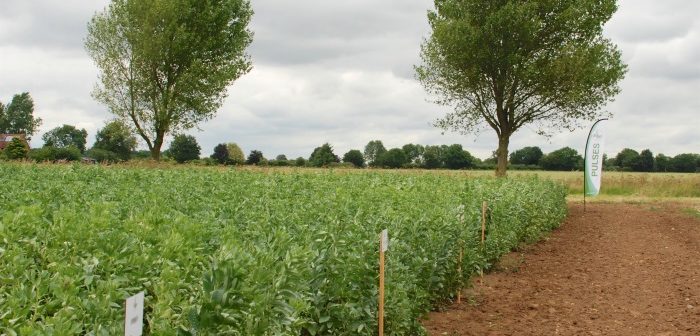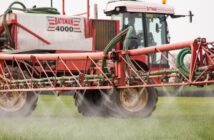Stephen Belcher, PGRO principal technical officer, comments on the 2016/17 trials season and on the new 2018 Recommended Lists:
“The over-winter period was again relatively mild and relatively dry. The lack of a frost mould on some soils caused difficulties in producing adequate seedbeds and caused establishment problems. The spring and early summer months were warmer than normal and the season for many crops was about two weeks earlier than 2016.
“The later summer months were unsettled, being wetter and cooler than normal.”
Combining Peas …
2017 trial yields (4.42t/ha) were a little down on the 5-year (4.77t/ ha) average, but were much better than in 2016. Powdery mildew (normally a late season disease) was evident in several trials, but was severe in the trial in North Yorkshire. Five trials went through to harvest and the highest yields came from most the southerly site in Hampshire. Three other trials yielded over 4t/ha.
Manager, a new white-seeded pea from KWS, joins the RL with a P1 recommendation as the top yielding variety with a yield of 108% of controls. Karpate, top yielder in 2016, moves to 2nd year of provisional recommendation. Kareni gains a full recommendation with a yield of 101%. Mascara remains with a full recommendation, while Salamanca and Gregor move to the outclassed category.
Three new large blues join the RL with a P1 recommendation, Kairoka (Senova), Bluetime (LSPB) and Blueman (LSPB) with yields of 107%, 106% and 102% respectively. Blueman has an excellent rating for downy mildew resistance, with a top rating of 9. Vertix and LG Stallion both progress to P2 recommendation. Kingfisher gains a full recommendation for 2017. Prophet, which shows consistent performance, Bluetooth and Daytona remain as fully recommended varieties. Crackerjack, on the list since 2008 and Campus are moved to the becoming outclassed category.
Small blue Greenwood progresses to P2 recommendation.
Maple pea varieties Mantara and Rose remain fully recommended.
Marrowfat Aikido gains a full recommendation for 2017 as the top yielding variety in the category. Sakura, just behind on yield remains fully recommended, while Genki is moved to the becoming outclassed category.
Winter Beans …
Beans established well in the mild autumn conditions and disease pressure in the spring and summer was lower than in 2016. 2017 yields (4.65t/ ha) were a little lower than the 5-year average of 5.16t/ha. Seven trials were harvested, and the top yielding site was in Lincolnshire at 6.2t/ha. The trial near Hereford suffered through a lack of rainfall and gave lower yields in 2017 than normally seen from this site.
New variety Vespa (pale hilum) from Senova joins the RL with a P1 recommendation. Yields at 102% are only 3% lower than the best. Bumble gains a full recommendation for 2017, with yields just 2% below the best. Top yielding varieties Tundra, Wizard and Honey remain with full recommendations. Yields from Honey are now below the best, but a combination of short straw and early maturity, means it finds favour in later maturing areas.
With the removal of Arthur from the outclassed category, all winter beans are now pale hilum types.
Spring beans …
Despite some very high yields, over 7t/ha from the two Yorkshire trials, 2017 yields (4.45t/ha) were well below the 5-year mean of 5.39t/ha. These northerly trials were late to be harvested.
New to the RL with a P1 recommendation is Mallory from LS Plant Breeding. Yields are just 2% below the best and it has good rating (7) for downy mildew resistance.
LG Cartouche progresses from P1 to P2 recommendation and ups its downy mildew rating from 4 to 5. Lynx gains a full recommendation for 2017 and tops the yield rankings at 104% of controls, whilst maintaining a good (7) rating for downy mildew resistance. Fanfare, Vertigo, Fuego and Tic bean Maris Bead all remain with a full recommendation.
Boxer and Fury were moved to becoming outclassed category.




